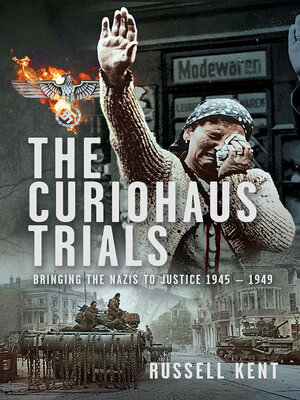
Sign up to save your library
With an OverDrive account, you can save your favorite libraries for at-a-glance information about availability. Find out more about OverDrive accounts.
Find this title in Libby, the library reading app by OverDrive.



Search for a digital library with this title
Title found at these libraries:
| Library Name | Distance |
|---|---|
| Loading... |
Reveals the untold story of the Curiohaus Trials in Hamburg, where hundreds of Nazi war criminals were prosecuted in the aftermath of WWII.
Mention war crimes trials to almost anyone and they will respond with one word, ‘Nuremberg.’ Most think there was only one trial following the Second World War, the International Military Tribunal, but this trial indicted only 24 defendants. They represented the most senior Nazis accused of conspiracy, crimes against peace, war crimes and crimes against humanity. But few were involved directly in any of the millions of individual atrocities. The victorious allies, the Soviet Union, the USA, Britain and France, tried hundreds of other cases in many different cities. The British trials took place in several locations in Germany, but most war criminals in British custody faced prosecution in one city. The Curiohaus Trials immerses readers in the untold story of war crimes trials that took place in a miraculously intact concert hall in war-torn Hamburg. Using freshly examined archive material, cross-referenced sources and information from the scenes of the crimes, this gripping account unveils the complex legal proceedings in courtrooms where orchestras previously played. Step by step, readers become immersed in the gathering of evidence, moving testimony and the intricate pursuit of truth. Amidst the search for justice, however, moral and ethical dilemmas arose. The book explores the challenges faced by prosecutors, defence lawyers and judges who had to navigate the fine line between seeking retribution and ensuring a fair trial in a shattered post-war society. It reveals an almost exclusive reliance on eye-witness testimony (even when physical evidence was available), a shocking decline in appetite to try those responsible for grievous atrocities and an astonishing absence of justice at the end of the process. The Curiohaus Trials is an essential read for those interested in modern history, international law and the search for justice.
Mention war crimes trials to almost anyone and they will respond with one word, ‘Nuremberg.’ Most think there was only one trial following the Second World War, the International Military Tribunal, but this trial indicted only 24 defendants. They represented the most senior Nazis accused of conspiracy, crimes against peace, war crimes and crimes against humanity. But few were involved directly in any of the millions of individual atrocities. The victorious allies, the Soviet Union, the USA, Britain and France, tried hundreds of other cases in many different cities. The British trials took place in several locations in Germany, but most war criminals in British custody faced prosecution in one city. The Curiohaus Trials immerses readers in the untold story of war crimes trials that took place in a miraculously intact concert hall in war-torn Hamburg. Using freshly examined archive material, cross-referenced sources and information from the scenes of the crimes, this gripping account unveils the complex legal proceedings in courtrooms where orchestras previously played. Step by step, readers become immersed in the gathering of evidence, moving testimony and the intricate pursuit of truth. Amidst the search for justice, however, moral and ethical dilemmas arose. The book explores the challenges faced by prosecutors, defence lawyers and judges who had to navigate the fine line between seeking retribution and ensuring a fair trial in a shattered post-war society. It reveals an almost exclusive reliance on eye-witness testimony (even when physical evidence was available), a shocking decline in appetite to try those responsible for grievous atrocities and an astonishing absence of justice at the end of the process. The Curiohaus Trials is an essential read for those interested in modern history, international law and the search for justice.







